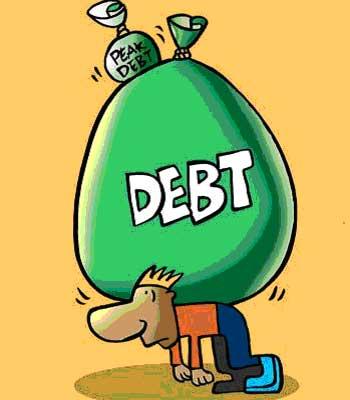 | « Back to article | Print this article |
How the world is drowning in excess debt!
My roommate was in a jam.
"You know when I took these credit cards I thought I will only use them in times of need," she said early in the morning.
"Houston, do we have a problem?" I asked.
"Yes, we have. I have gone on a shopping blitzkrieg all of this month and just realised the amount of money I spent," she explained.
"How did you just realise?"
"Oh, three credit card bills just landed up."
"So repay, what's the problem?" I suggested.
"Only if I had the money to repay," she said with a sob.
"Ah. So you are in the same mess as most of the Western Economies are."
"Western economies? Here I was telling you my own little sob story, and you have escalated my problem to such a huge level."
"Well, I just couldn't resist the analogy," I said.
"Yeah. That I can tell! So tell me what this one is all about?" she said.
Click NEXT to read on . . .
How the world is drowning in excess debt!
"You would definitely know by now that the United States and most of Europe are deep in debt."
"Yes, that I know."
"The government debt in the United States currently stands at $14.36 trillion. This expressed as a percentage of the US gross domestic product (GDP) is 96 per cent."
"Whoa!" she exclaimed. "That's a lot of money they owe to others."
"They surely do. In fact, the US debt is nearly 9.4 times the Indian GDP."
"And this is a problem across the other parts of the world too?"
"It sure is. Take the case of several countries in Europe. The government debt-to-GDP ratio in Greece is around 158 per cent, for Italy is 120 per cent, for Ireland 112 per cent, and Portugal it is around 102 per cent."
"Oh my. So countries have been behaving no differently than I am."
"Yes, that seems to be the case."
"So how do they manage to repay this debt?" she asked.
"They don't," I replied. "They roll it over."
"Roll it over? As in?"
"Every country raises debt through issuing bonds which pay a certain rate of interest. Investors buy these bonds. When these bonds mature, governments have to repay the money the investors had invested in these bonds."
Click NEXT to read on . . .
How the world is drowning in excess debt!
"But governments don't have money to repay these bonds?" she interrupted.
"No, they don't."
"So what do they do then?"
"Oh, they issue new bonds. And the money brought in by the new bonds is used to pay off the money due against the earlier bonds."
"But are investors ready to invest again in these bonds, when they know that the governments really do not have the money to repay and all that they are doing is simply rolling over money?" she asked.
"Good question. At least in the case of the United States, they are. As John Mauldin and Jonathan Tepper write in their book Endgame: The End of The Debt Supercycle and How It Changes Everything, 'Simply put, because the US debt is growing with no end in sight, we're not paying down our debt. We simply roll it. We issue new debt to pay off the old and borrow a little more each time The only reason to hold a government bond is because someone else might pay for it there might be a greater fool out there somewhere. The problem is that eventually the market can run out of fools'," I quoted.
Click NEXT to read on . . .
How the world is drowning in excess debt!
"So, now countries need to borrow to repay bonds that are maturing. And they also need to borrow to meet their current expenditure. So the debt just keeps growing. You have told me in the past that countries spend more than they earn through taxes and the difference they make up through borrowing," she explained.
"Yes, you are right. Also investors are still ready to invest in case of the US primarily because the US has the debt in its own currency, i.e. the dollar. And worst come worst, they can print dollars to repay their debt."
"Very interesting. But what about Europe?"
"Unlike the US, countries in Europe which use Euro as a currency are not in a position to print money to repay their debt. This is primarily because Euro is a currency across multiple countries and no one country can decide to print it to pay maturing debt," I said.
I went on: "The European Central Bank is buying up the debt that is maturing because countries like Greece, Ireland, Italy, etc really do not have the money to pay back."
Click NEXT to read on . . .
How the world is drowning in excess debt!
"But where is ECB getting money from to repay the maturing debt?" she asked.
"Well, some of the bigger member states, like Germany and France, have contributed to a rescue fund. France too is not in a great shape financially. ECB might also be printing money to repay the maturing debt. But Germany, the biggest economy in Europe, is really not comfortable with the idea of rescuing their errant neighbours or with the idea of printing money."
"So what will happen then?" she asked.
"Unless investors who owe money to these countries get ready to take a haircut, defaults from these countries are inevitable."
"Haircut? Where did that come from?" she butted in.
"Haircut is a term which refers to investors partially foregoing a part of the money that is owed to them. So like you owe Rs 75,000 to the banks on your credit card bills, if the banks forego Rs 25,000, then we say that the bank is taking a haircut."
"That's something I could do with."
Click NEXT to read on . . .
How the world is drowning in excess debt!
"Yeah. As hedge fund manager Puru Saxena wrote in a recent article, 'In Greece, government debt now represents almost 160 per cent of GDP. Thus, if Greece's debt is rolled over without restructuring (i.e. investors take a haircut), its interest costs alone will amount to approximately 24 per cent of GDP. In other words, if debt pardoning (i.e. investors take a haircut) does not occur, nearly a quarter of Greece's economic output will be gobbled up by interest repayments! Looking at this simple math, it is obvious to us that unless the Germans or the French comes to its rescue, Greece will default within 2-3 years'," I said quoting from the article.
"But Greece is a very small country. I mean even if it defaults, that doesn't mean much."
"Yes, that is right. But Greece is what experts are calling the 'canary to the coal mine'."
"What's that?" she asked.
"In an underground coal mine if dangerous gases like carbon monoxide or methane start spewing out, they kill the canary (a bird carried along in a cage) before killing the miners. So if the canaries are dying its time to abandon the mine. Similarly, Greece is the small bird. . . if it dies, it is a signal to larger troubles that lie ahead," I explained.
"Larger troubles?"
Click NEXT to read on . . .
How the world is drowning in excess debt!
"Yeah. Take the case of Italy. It has an outstanding debt of $2.7trillion and no money to repay. As Saxena writes, 'According to our estimates, if the average interest rate on Italy's debt rises to 6 per cent by 2014, annual financing costs will jump to Euro 110 billion or almost 7.5 per cent of the GDP. Given the sheer size of the sums involved, it is highly unlikely that the German and/or the French citizens will allow their governments to pick up Italy's tab. Thus, it is our contention that Italy will ultimately prove to be a bigger nightmare than Greece'," I added.
"So there is a huge problem about which nothing much has been done yet!"
"Yes. But the biggest problem is in Japan."
"Japan? Now where did that come from?" she asked.
"Over the last 20 years, the Japanese government has been running massive fiscal deficits. Their current debt-to-GDP ratio stands at around 200 per cent of GDP."
"200%? That's much more than everybody else!" she exclaimed.
Click NEXT to read on . . .
How the world is drowning in excess debt!
"Yes, it is. But nearly 94 per cent of the debt is domestic. So worst come worst, they can print Yen and return the money. As Mauldin and Tepper write, 'They started their lost decades with savings rate of almost 16 per cent and are now down to 2 per cent, as their aging population spends its savings in retirement. They have had no new job creation for 20 years and their nominal GDP is where it was 17 years ago'."
"What does that imply for Japan?" she asked.
"As more and more Japanese get their money out of government debt, the government will have to borrow from abroad. Borrowing internationally means they will have to offer higher rates of interest. And that, of course, doesn't sound good."
"I guess I have had enough of this negativity. And I thought my problem was big," she remarked rather philosophically.
"Now take some money from me. Repay your credit card outstanding and don't go on a shopping binge again."
"Thanks a ton. Repay the money, I will. But I can't promise you the second thing. A woman who does not shop is as good as dead," she emphasised.
The author can be reached at shonalee.biswas@rediffmail.com







